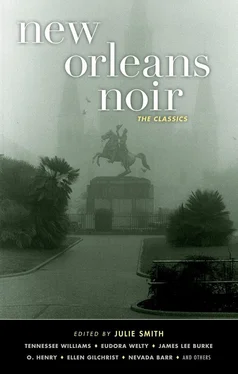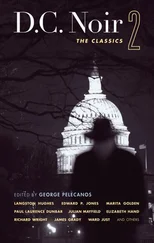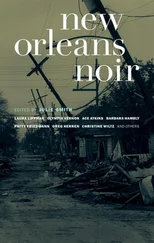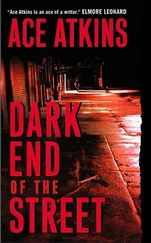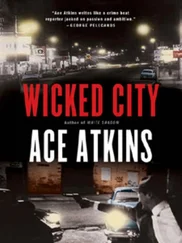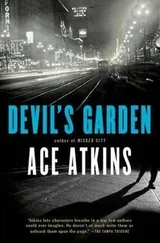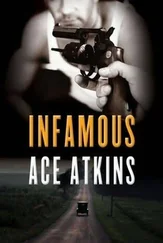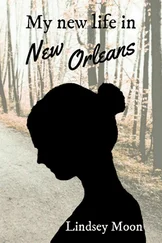Ace Atkins - New Orleans Noir - The Classics
Здесь есть возможность читать онлайн «Ace Atkins - New Orleans Noir - The Classics» весь текст электронной книги совершенно бесплатно (целиком полную версию без сокращений). В некоторых случаях можно слушать аудио, скачать через торрент в формате fb2 и присутствует краткое содержание. Город: New York, Год выпуска: 2016, ISBN: 2016, Издательство: Akashic Books, Жанр: Детектив, на английском языке. Описание произведения, (предисловие) а так же отзывы посетителей доступны на портале библиотеки ЛибКат.
- Название:New Orleans Noir: The Classics
- Автор:
- Издательство:Akashic Books
- Жанр:
- Год:2016
- Город:New York
- ISBN:978-1-61775-384-8
- Рейтинг книги:3 / 5. Голосов: 1
-
Избранное:Добавить в избранное
- Отзывы:
-
Ваша оценка:
- 60
- 1
- 2
- 3
- 4
- 5
New Orleans Noir: The Classics: краткое содержание, описание и аннотация
Предлагаем к чтению аннотацию, описание, краткое содержание или предисловие (зависит от того, что написал сам автор книги «New Orleans Noir: The Classics»). Если вы не нашли необходимую информацию о книге — напишите в комментариях, мы постараемся отыскать её.
takes a literary tour through some of the darkest writing in New Orleans history.
New Orleans Noir: The Classics — читать онлайн бесплатно полную книгу (весь текст) целиком
Ниже представлен текст книги, разбитый по страницам. Система сохранения места последней прочитанной страницы, позволяет с удобством читать онлайн бесплатно книгу «New Orleans Noir: The Classics», без необходимости каждый раз заново искать на чём Вы остановились. Поставьте закладку, и сможете в любой момент перейти на страницу, на которой закончили чтение.
Интервал:
Закладка:
Narrator: Any insights into the murder of James Roberts last summer by Joe Brown Jr.?
Mr. Spaulding: We are building community centers, baseball diamonds, basketball courts, little leagues, golden-agers facilities, barbecue pits, swimming pools, badminton nets, and... if our dreams come true... well-supervised and policed bowling alleys. It is our firm hope that sociology will stay out of neighborhood bars.
Narrator: Thank you, Mr. Spaulding.
[ The scene shifts to a middle-aged woman sitting on a well-worn couch. She is wearing a plain dress. There is a small table with a lamp and Bible on it next to the couch. She is Mrs. Brown, Joe’s mother. Across the stage, sitting in a big easy chair, is a middle-aged man in work clothes. He is Mr. Brown, Joe’s father. He is drinking a large can of beer which, from time to time, he will place on the floor. He listens to what Mrs. Brown says intently, but there must be an air of distance in his attitude toward her and what she says, never affection. The audience must be made to believe they are in different places .]
Narrator: [ Solemnly ] This is Joe Brown’s mother. [ A spot focuses on Mrs. Brown. There is enough light, however, to see Mr. Brown .]
Mrs. Brown: Joe was always a sweet kind boy, but Joe’s problem is that he... stopped... going... to... church. I told him about that but it didn’t make any difference. When we climb out of Christ chariot we liable to run into trouble. I tell the truth about my own children, like I tell it on anyone else. Once, before Joe got married, he came home in a temper about his boss and his job. Talking bad about the white folks. Said he wished something from another planet would destroy them all. Said he didn’t like the way his boss talked to him, that he should be paid more, and like that. We all get mad at the white people, but there is no point in it. So many colored folks ain’t even got a job. I told him, If you think you can do better, go back and finish school. But no, he didn’t finish school, he just complained. Stay in church , I told him, but he started hanging around with bad friends. Bad friends lead to a bad end. Talking bad about white people is like busting your head against a brick wall.
Narrator: Mrs. Brown, do you feel your son would kill for no reason? There must have been a reason.
Mrs. Brown: When you hang around a bad crowd on Saturday nights, troubles are always gonna come. I told him to stay out of those bars. I don’t know what happened or why. A friend told me the other boy was teasing Joe and Joe got mad. He was sensitive, you know, very serious and sensitive. He didn’t like to be rubbed the wrong way.
Narrator: Mrs. Brown, the purpose of this program is to discover why your son knifed his friend. No one seems to have answers. We are using the scientific approach. Do you have any answers?
Mrs. Brown: [ Despairingly. ] I don’t know why. I don’t understand. You try to protect your children as best you can. It’s just one of those things that happens on Saturday nights in a colored bar; like a disease. You hope you and nobody you know catches it. The Lord is the only protection.
Narrator: And your husband? Would he have any information, any ideas?
Mrs. Brown: [ Sharply. ] I haven’t seen that man in four years.
[ Both Mrs. Brown and narrator look at Mr. Brown .]
Mr. Brown: I plan to go see the boy... I just haven’t had a chance yet. I have another family now and I can’t find any work. I help him out when I can, but... [ pause ]... I can’t understand why he would do a thing like that.
Narrator: If we could hear what James Roberts has to say.
[ We return to the summertime theme and the scene of the crime, the barroom where the play began with Joe Brown Jr. standing over James Roberts’s body and all other actors frozen in their original positions as in the opening scene. After the narrator speaks the body of James Roberts begins to slowly arise from the floor aided by Joe Brown. It is important that Brown helps Roberts get up .]
James Roberts: [ Begins to laugh ...] It was all a joke. Nothing happened that hasn’t happened between us before. Joe is still my best friend... if I were alive I would tell anyone that. That Saturday was a terrible one... not just because the lights went out for me. I heard a ringing in my ears when I woke up that morning. When I went to work at the hotel the first thing I had to do was take out the garbage. Have you ever smelled the stink of shrimp and oyster shells first thing in the morning? I hate that. The sounds of the street and the moan of the cook’s voice; that’s enough to drive anyone crazy, and I heard it every day. That day I decided to leave my job for real... one more week at the most.
Joe Brown Jr.: [ Getting up from the bunk into a sitting position. ] Damn. The same thing happened to me that day. I decided I was going to leave my job.
James Roberts: [ Looking at Joe with disgust .] Man, you are disgusting. You all the time talking about leaving your job.
Narrator: [ To Roberts, then to Joe .] Get to what happened at the café, please. We don’t have all night.
James Roberts: We were both very uptight... mad at our jobs — everybody... everything around us.
Joe Brown Jr.: [ Excitedly ] I know I was... I was ready to shoot somebody.
James Roberts: Shut up. This is my scene.
Joe Brown Jr.: You won’t even let anybody agree with you.
Narrator: Please.
James Roberts: Joe went on and on all evening and all night. We were getting higher and higher, going from bar to bar. We went to Scotties, then to Shadowland, to the Havana... we had my sister’s car... Joe getting mad and frustrated and talking ’bout what he was gonna do. By the time we got to the Ninth Ward Café, we was both stoned out of our minds. Joe getting dreamier and dreamier. He was talking about all his problems, his wife, his job, his children. I could understand that.
Joe Brown Jr.: You really couldn’t because you don’t have those problems.
[ We hear Otis Redding’s “Satisfaction” from the album Otis Redding Live.]
James Roberts: Joe was screaming about the white man. He said he was $1,500 in debt... working like hell for the white man, then turning right around and giving it back to him. He said he couldn’t laugh no more.
[ From this point on there must be little connection between Joe’s thoughts and those of James Roberts. The Otis Redding recording continues, but must not drown out the speeches .]
Joe Brown Jr.: I had a dream... I had a dream... I dreamed I had $66 million left to me by an unknown relative...
James Roberts: [ Slow, to the music. As much pantomime as possible, as though he is reenacting the scene .] We were in the Ninth Ward Café sitting in a booth by ourselves. There was something on the jukebox, I believe it was Otis Redding. It was a hot night. Joe was talking about how there was nowhere he could go to relax anymore. Then, suddenly, his mind would go off into outer space somewhere and I had to jerk him back. I would ask him what he was thinking about, and he would say he wasn’t happy with himself. He didn’t know himself or where he was headed to anymore.
Joe Brown Jr.:... I always get screwed up when I try to figure out the first thing I’m going to buy... a new car... maybe... Mark IV... a new house... a brick one with wood paneling... a new suit... a tailor-made three-piece... new shoes... some high steppers... a new transistor radio... a big Sony that plays loud with big sound... Then I’d give everybody a bill... but I can’t figure out what I’m going to buy first .
James Roberts: I said, Man, what are you talking about? I don’t understand all this blues over what happens every day. He said he wanted to believe there is hope. I told him there is no hope. You a black motherfucker and you may as well learn to make the best of it.
Читать дальшеИнтервал:
Закладка:
Похожие книги на «New Orleans Noir: The Classics»
Представляем Вашему вниманию похожие книги на «New Orleans Noir: The Classics» списком для выбора. Мы отобрали схожую по названию и смыслу литературу в надежде предоставить читателям больше вариантов отыскать новые, интересные, ещё непрочитанные произведения.
Обсуждение, отзывы о книге «New Orleans Noir: The Classics» и просто собственные мнения читателей. Оставьте ваши комментарии, напишите, что Вы думаете о произведении, его смысле или главных героях. Укажите что конкретно понравилось, а что нет, и почему Вы так считаете.
